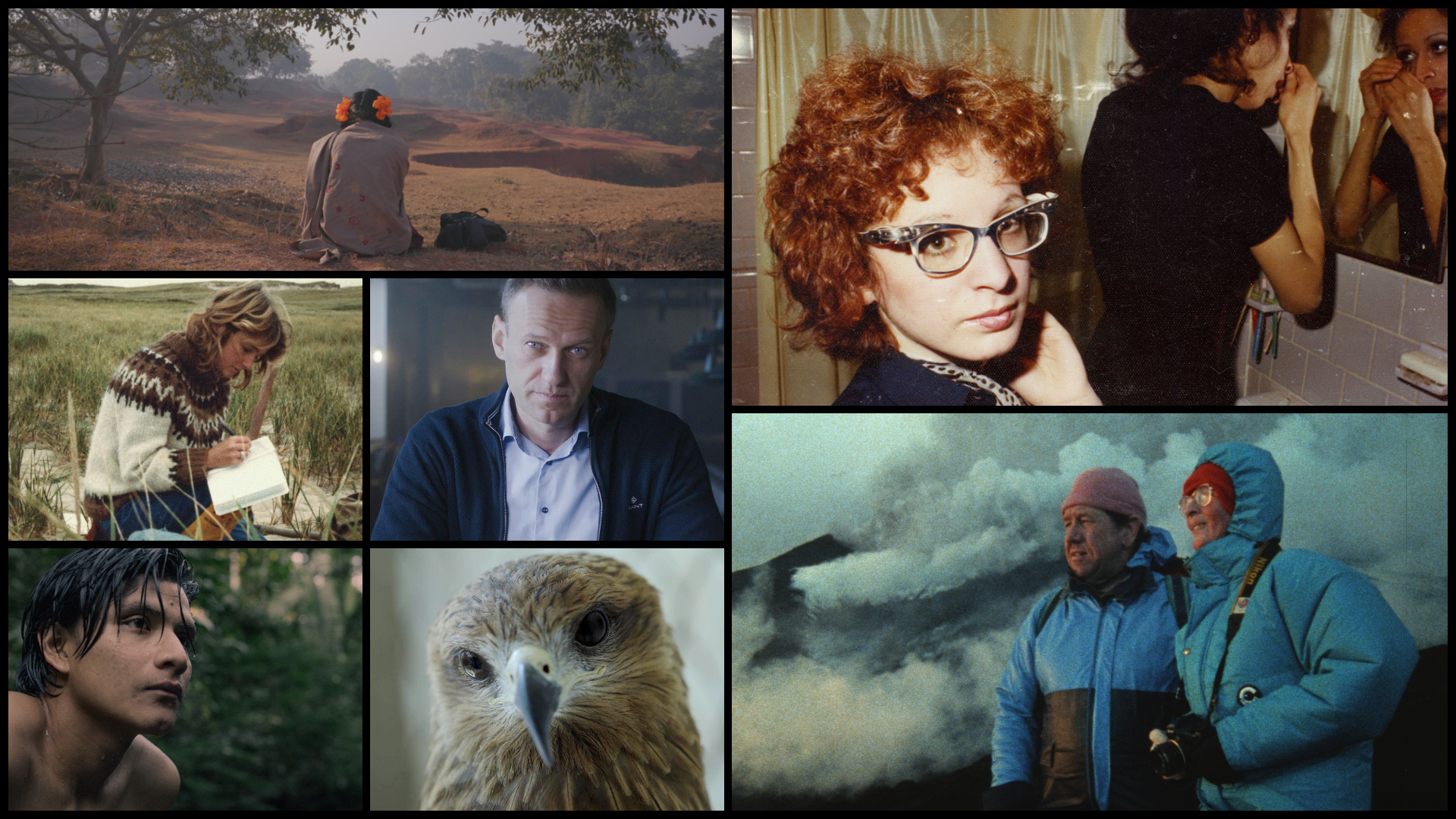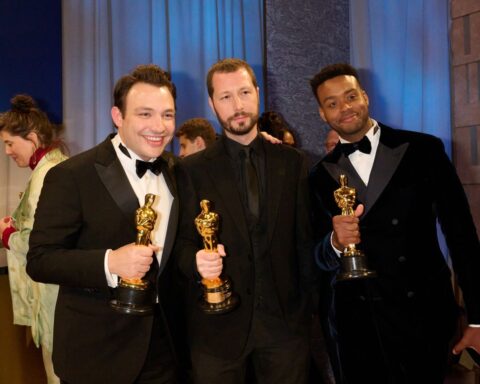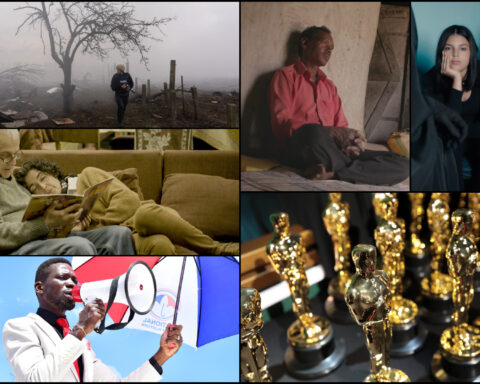Last year, POV’s team enjoyed the rare feat of agreeing on the top docs films of the year: Flee and Summer of Soul. This year, our lists of the best documentaries that 2022 had to offer found even greater consensus. We’ve therefore combined our picks into one list of the best documentaries of 2022. There are festival favourites, Oscar frontrunners, hidden gems, and, in a first, Canadian directors account for half the list. We hope our picks for the year’s best inspire some holiday viewing among our readers.
– Marc Glassman (MG) & Pat Mullen (PM)
The Best Documentaries of 2022
1. All the Beauty and the Bloodshed (dir. Laura Poitras)
All the Beauty and the Bloodshed is not only the best documentary of the year, but also 2022’s finest film. Laura Poitras’ profile of controversial, ground-breaking photographer Nan Goldin is remarkable: political, artistic and emotional. Throughout the film, Poitras uses a parallel structure, moving between Goldin’s on-going fight against the Sackler family, the makers of the devastating addictive drug OxyContin, and her history as a brilliant photographer in New York’s underground scene back in the ’70s and AIDS activist in the ’80s. Her campaign through P.A.I.N. (Prescription Addiction Intervention Now) advocates for the removal of the Sackler name from museums and galleries around the world, where they had sought to create an impeccable reputation though billions in donations. It provides a wonderful counterpoint to Goldin’s tale of becoming an artist and one of the leading voices of a generation that opened up the world to sexual diversity and then suffered through the terrifying pandemic of AIDS. Suffused with images from Goldin’s classic photo slide show Ballad of Sexual Dependency and her compelling ruthlessly honest monologues, Poitras’ film is emotionally triumphant, charting an artist’s path towards victory against a ruthless oppressive forces. It’s a well-earned success in a tragic time. – MG
Poitras outdoes herself by situating Goldin’s activism amid her family history, photography, experience with abuse, and the AIDS crisis. There has been no better articulation that “silence equals death” than this potent essay about holding people in power accountable for their misdeeds. – PM
2. Fire of Love (dir. Sara Dosa)
Fire of Love has just about everything one wants in a film: love, exotic locales, fate, celebrity culture, the media and, of course, death. As Sara Dosa’s sprightly, compelling documentary shows, Maurice and Katia Krafft engaged in a uniquely French ménage à trois: they loved each other—and volcanoes. The most extraordinary element in Fire of Love is the footage of the volcanoes. The shots are literally to-die-for: the Kraffts took crazy risks to get photos and film shoots that no one else would try to make. It made them stars in France and the scientific community. More and more, they studied what is called pyroclastic surges: eruptions of ash and gas that can cause massive deaths in civilian populations if they’re not spotted early enough. The Kraffts went where other volcanologists wouldn’t go, right into the heat of danger in the deadly grey volcanos, which eventually caused their demise at Japan’s Mount Unzen in 1991. This extraordinary film documents the Kraffts’ embrace of love and death and the seductive power of volcanoes .– MG
3. To Kill a Tiger (dir. Nisha Pahuja)
A project like To Kill a Tiger only comes along when filmmakers truly care about their subjects. After immersing herself in the work of activist Mahendra Kumar to understand the social factors that breed cycles of violence against women in India, Kumar introduced Pahuja to the story of Ranjit, his wife Jaganti, and their daughter. The film observes as the family fights to hold the daughter’s assailants accountable for a violent rape. Pahuja gathers perspectives from parties on all sides and situates one girl’s plight within a larger patriarchal society that conditions men to neglect the rights, needs, and dignity of women, and inspires women simply to accept their fate. This film potently captures the bravery it takes to break the cycle. It’s the best Canadian film of the year. – PM
4. The Territory (dir. Alex Pritz)
Anyone who wants to wade into the difficult question of authorship and authentic storytelling must see The Territory. American filmmaker Alex Pritz joins forces with members of the Uru-eu-wau-wau tribe to chronicle the story of their fight to protect the Brazilian rainforest. The film is a feat of collaborative and participatory filmmaking that should be studied for years to come. Pritz and company teach members of the tribe to use cameras and document their story, which enables the Uru-eu-wau-wau to keep production going safely when COVID-19 closes access to the territory. In doing so, the film also gets footage that Pritz himself admits he wouldn’t have been able to capture on his own, like the arrest of an illegal logger. This film thrillingly shows the stakes in an urgent fight from the perspectives of players at the front lines. – PM
5. All that Breathes (dir. Shaunak Sen)
As the world reels through a vast series of ecological disasters, it’s heartening to see people reacting positively in their own ways. Not everyone wants to make speeches or participate in massive political parades. Some make a difference in personal ways. Nadeem and Saud are brothers living in Delhi, who have it made it their mission to save black kites, a carnivorous ancient bird suffering from the appalling conditions in a city that is rampant with pollution. Fundraising constantly, they have spent the past 20 years rescuing 20,000 birds that have been injured due to the environment. Visually a true artistic delight, All that Breathes is winning awards everywhere, from Sundance to Cannes, in London and Hong Kong and from the Asia Pacific to Gotham’s Independent event. Unpretentious and sober, this is a film with an immense emotional impact. Truly, the brothers have dedicated their lives to good deeds in a harsh society and world.– MG
6. Geographies of Solitude (dir. Jacquelyn Mills)
A visual and aural treat, Geographies of Solitude is truly film art. Any viewer will be struck by the look of this stunning, exotic film. Lovers of documentaries and photo essays set in unique natural locations will be transfixed by it. But Mills has done more than make a great nature doc: she’s created a film that challenges viewers philosophically while seducing us with extraordinary visions. What is clear from the outset is the director’s unteachable poetic eye—Mills has it and we’re the better for it. Set on Sable Island, in the Atlantic Ocean, the film profiles both the natural surroundings and its scientist and main resident, Zoe Lucas. While Mills clearly has come to admire and respect Lucas, her film is more interested in what transpires on Sable among the seals, birds and horses that make up so much of the life on the island. Her approach mirrors that of Lucas, in many ways, a documentarian herself. Geographies of Solitude won three prizes at the prestigious Berlin Festival and two awards at Hot Docs including Best Canadian film. It’s gone on to win accolades in Korea, Canada and Italy. This is a special work, a must see, for those of us who love poetic expression in the arts. – MG
7. Navalny (dir. Daniel Roher)
There’s nothing better in journalism than a “gotcha” moment. Great docs don’t need a major secret to be revealed in order to be compelling, but it doesn’t hurt. In Daniel Roher’s candid portrait of Russian opposition leader Alexei Navalny, it was generally agreed that Putin’s spies had almost succeeded in assassinating him. But how do you prove it unless someone confesses? With the aid of two investigators, one from the open-source intelligence service Bellingcat and the other from his own team, Navalny and Roher are actually in the room when one of the poisoners is fooled into admitting to the deadly conspiracy while being recorded and filmed. The film gives a good sense of Navalny—a man of optimism and principles—and his warm relationship to his wife and children. Given that Russia is continuing its war against Ukraine and Navalny has been imprisoned, this documentary is must-viewing for anyone interested in the fate of Russia and our imperiled world.– MG
8. Rojek (dir. Zaynê Akyol)
The question of what inspires a person to take up arms in a holy war fuels Zaynê Akyol’s Rojek. The Kurdish-Canadian filmmaker returns to the scorched fields of Syrian Kurdistan to witness her homeland on fire. There are burning questions as she sits down with members of ISIS to learn about their experiences, motivations, and philosophies. Fuelled by direct-address interviews with men and women of ISIS, Rojek affords the subject the nuance, complexity, and, above all, ethical care it deserves. Questions are permitted to go unanswered, and the tone of inquiry is one of understanding rather than accusation. There are stories of family life, children, and lost freedom. Nobody is named, and nobody is pressed. These are conversations in lieu of interrogations. If only this film received a fraction of the attention that another film on a similar topic unfortunately exploited! – PM
9. Good Night Oppy (dir. Ryan White)
Forget Lightyear, forget Avatar, forget Top Gun. The wildest adventure of 2022 is Good Night Oppy. Director Ryan White pulls off a dazzling feat of non-fiction wizardry as he and the crew at Industrial Light and Magic create a photo-real representation of the Martian landscape. The meticulously researched VFX sequences bring audiences along for the ride as NASA rovers Spirit and Opportunity explore the surface of Mars. Even more impressive than the technical bravura of Good Night Oppy, though, is the human heart at its centre. Thanks to the extensive archival material, White seemingly unfolds the rovers’ mission in the present tense. As the scientists and researchers revisit their story in contemporary interviews that are spliced between the archives, White captures the genuine connection that these people made with robots while working with them intimately for 15 years. Few films this year are as deeply moving. – PM
10. Eternal Spring (dir. Jason Loftus)
Canada has a long documentary tradition rivalled by few countries. It’s astounding that it took us 50 years to submit a documentary in the Oscar race for Best International Feature. Eternal Spring also gets historic firsts as our only animated submission to date and first Mandarin submission. This year’s Hot Docs Audience Award winner finds its spark through the collaboration between director Jason Loftus and subject Daxiong. The artist works with Loftus to tell his story of confronting censorship by the Chinese government. He does so by recreating his tale in beautiful animation. The sequences of Daxiong’s animation work twofold as they underscore the absence of archival materials and, in some cases, witness testimonies as participants are no longer around to tell their tale. The film notes the history lost to oppressive governments, but also the voices that find inspiration in the face of adversity. – PM
Marc’s Honourable Mentions
Moonage Daydream (dir. Brett Morgen)
Rock docs are the mutant children of the non-fiction form. Revelling in great performances and loud music, they’re based on spectacle, not quiet revelatory truths. Brett Morgen, who managed to be thoughtful and extravagant in his Kurt Cobain doc, does a terrific job in exploring the enigma that is David Bowie. Released in IMAX, the format one should view this film if at all possible, Moonage Daydream captures one of the most brilliant rock legends in several of his incarnations: as a glam rock icon, an artistic recluse in Berlin and an extraordinary British gentleman singing with other stars. No one will ever know what made Bowie tick, but Morgen does wonderfully well in presenting this consummate performer at his absolute best.
Mis dos voces (dir. Lina Rodriguez)
Lina Rodriguez has made an essay film about women who have immigrated to Canada from Latin America, but does so in a challenging and rewarding manner. Rodriguez refuses to show the women—Ana, Claudia, and Marinela—on screen. She instead relies instead on their disembodied voices to tell their tales. In doing so, she disrupts the standard liberal approach to making a documentary about workers from another culture and society. As viewers, we’re not allowed to adopt an all-too-easy sympathetic gaze. By rendering them invisible, as they are to most people, Rodriguez has turned the camera on us. Rodriguez has stated her intention: “By refusing to provide a clear correspondence between sounds and images, I built the film around an ongoing tension between what we see and what we hear.” In doing so, she’s made a perceptive art film that does what docs do best: show humanity with precision and purpose.
Unloved: Huronia’s Forgotten Children (dir. Barri Cohen)
Unloved is an intensely personal film that succeeds on both an intimate level and as an investigative look at a tragic chapter in the history of Ontario. Cohen’s film is set in the now closed Huronia Regional Centre for intellectually disabled children, one of three institutions that housed thousands of purported “imbeciles and idiots,” for over 125 years. As early as the Sixties, journalists including Pierre Berton exposed Huronia and the others as places that caused neglect, harm, and abuse, but it took another 40 years for them to be closed down. Cohen’s half-brothers Alfred and Louis died there, as did so many others over the decades. While covering her story, Cohen follows survivors of Huronia, who were involved in a successful multi-million-dollar class action suit and apology from the province. The film builds to an appropriate climax, with the reclamation of long hidden graves on Huronia’s site. Cohen has made a powerful documentary, which moves seamlessly from the personal to the political and historical.
Pat’s Honourable Mentions
Casa Susanna (dir. Sébastien Lifshitz)
The story of a 1960s’ commune for transgender people receives an affectionate appreciation from people who found a safe haven at a time when it was a crime to be themselves.
Framing Agnes (dir. Chase Joynt)
A genre-bending, gender-bending feat of documentary that rewrites trans narratives through performance.
A House Made of Splinters (dir. Simon Lereng Wilmont)
This poignant observational doc takes audiences inside a home for Ukrainian children “orphaned” by war when their parents can no longer care for them. It’s an essential snapshot of the human toll in an immediate crisis.
Last Flight Home (dir. Ondi Timoner)
Simply devastating. The filmmaker offers an intimate portrait of her father’s journey through the end-of-life process. It’s a work of great compassion and love.
Okay! (The ASD Band Film) (dir. Mark Bone)
Scrappy, screechy, and boisterously off-key, this portrait of a Toronto band comprised of members on the Autism spectrum is a lot of fun.
Extra special mention: Marcel the Shell with Shoes On (dir. Dean Fleischer-Camp)
Move over, Spinal Tap! The new king of the mockumentary is this tale of a talking mollusk with googly eyes. The film ingeniously uses a documentary aesthetic to afford authenticity and realism to Marcel’s world. It’s both impressive and depressing how many people asked me if it’s a “real documentary.” I’ve never seen a shell with shoes on, nor one that talks, but stranger things have happened.














